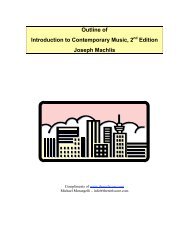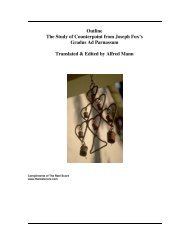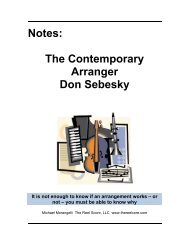An Outline of The History of Western Music Grout ... - The Reel Score
An Outline of The History of Western Music Grout ... - The Reel Score
An Outline of The History of Western Music Grout ... - The Reel Score
You also want an ePaper? Increase the reach of your titles
YUMPU automatically turns print PDFs into web optimized ePapers that Google loves.
I. Sonata, Symphony, and Opera in the Early Classic Period<br />
A. <strong>The</strong> Enlightenment<br />
1. Challenged established systems <strong>of</strong> thought and behavior<br />
a) religion - valued individual faith and practical morality more than the church as an<br />
institution<br />
b) philosophy & science - emphasis on reasoning from experience and careful<br />
observation - favored the study <strong>of</strong> the human mind, emotions, social relations and<br />
organizations<br />
c) social behavior - naturalness was preferred to artificiality and formality<br />
d) belief in individual rights - challenged the authority <strong>of</strong> the state<br />
2. Stood for the conviction that reason and knowledge could solve social and practical<br />
problems<br />
a) Religion, philosophical systems, science, the arts, education, the social order were<br />
all being judged by how they contributed to the well being <strong>of</strong> the individual<br />
b) Francis Hutcheson (1694-1746) in "Concerning Moral Good and Evil" defined the<br />
ethical ideal as - 'the greatest happiness for the greatest numbers'<br />
3. <strong>The</strong> French 'philosophes'<br />
a) Rousseau, Montesquieu, and Voltaire were social reformers<br />
b) reacted in response to the terrible inequalities between the conditions <strong>of</strong> the<br />
common people and that <strong>of</strong> the privileged classes in Europe<br />
B. Background<br />
1. Science - the advances in the application <strong>of</strong> scientific discoveries affected not only<br />
industry and commerce, but the arts as well<br />
2. A Cosmopolitan age<br />
a) foreign born rulers - German Kings in England, Sweden, & Poland, Spanish King<br />
in Naples, French Duke in Tuscany, German Princess (Catherine the Great) in<br />
Russia<br />
b) intellectuals and artists traveled freely<br />
c) the humanity that all people shared mattered more than national and linguistic<br />
differences - at least for those able to travel beyond their local regions<br />
d) musical life reflected this cosmopolitan culture<br />
1: German Symphonic composers were active in Paris, Italian Opera composers &<br />
singers worked in Austria, Germany, Spain, England, Russia, and France<br />
2: Johann Joachim Quantz (1697-1773) - proposed that the ideal musical style<br />
was made up <strong>of</strong> the best features <strong>of</strong> the music <strong>of</strong> all nations<br />
e) Vienna as a cosmopolitan center<br />
1: People<br />
i- from 1745-1765 the emperor was a Frenchman (Francis Stephan <strong>of</strong><br />
Lorraine)<br />
ii- imperial poet was an Italian (Pietro Metastasio)<br />
iii- a German (Johann Adolph Hasse 1699-1783) composed operas in the<br />
Italian style to Metastasio's librettos<br />
iv- manager <strong>of</strong> the court theaters was an Italian (Count Giacomo Durazzo)<br />
v- imported French company mounted a regular season <strong>of</strong> 'opéra comique' -<br />
with French style ballets also popular





